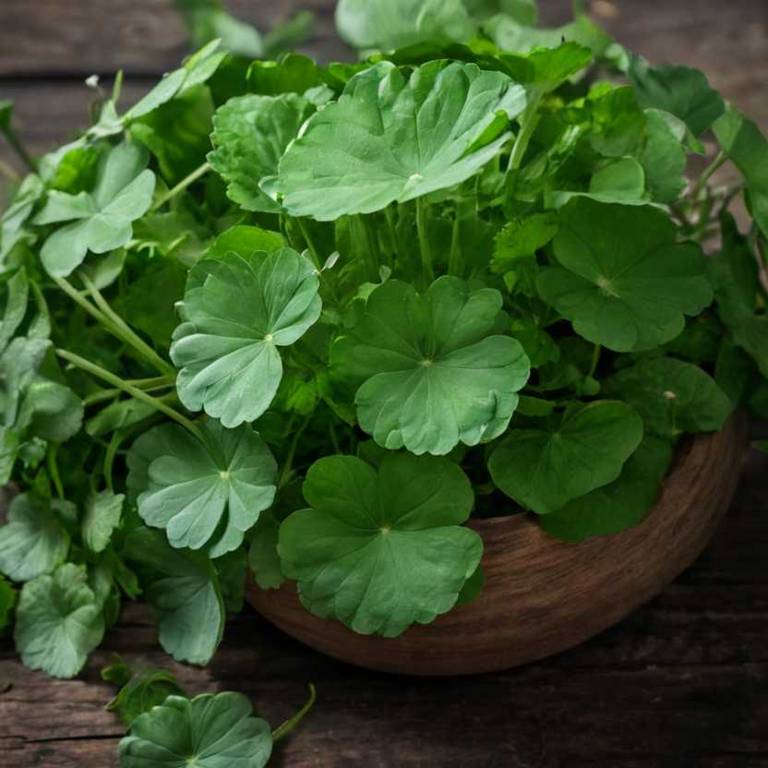By Leen Randell
Updated: Jul 05, 2024
What Are The Medicinal Properties Of Centella Asiatica (Asiatic Pennywort)?

Centella asiatica, also known as asiatic pennywort, has health benefits such as improving cognitive function, reducing inflammation, and promoting wound healing.
The herb contains triterpenoids, flavonoids, and alkaloids, which are believed to contribute to its medicinal properties. In traditional medicine, the herb is prepared as a tea, extract, or topical cream to treat various ailments. However, excessive consumption may cause gastrointestinal side effects, such as diarrhea or nausea.
Caution is advised for pregnant or breastfeeding women, as the herb's effects on fetal development are not well established.
This article explains the health benefits, active constituents, medicinal preparations, possible side effects, and precautions related to Centella asiatica.
What are the health benefits of Centella asiatica?
Centella asiatica, also known as asiatic pennywort, has health benefits such as reducing inflammation and improving cognitive function.
It is also used to treat skin conditions, including acne and eczema, due to its anti-aging and antioxidant properties. Additionally, centella asiatica is believed to improve blood flow and lower blood pressure, making it a popular ingredient in traditional herbal remedies.
It may also aid in wound healing and scar prevention.
Here's a detailed article about the 10 health benefits of Centella asiatica.
What are the active constituents of Centella asiatica?
Centella asiatica, also known as asiatic pennywort, has active constituents such as flavonoids, terpenoids, and triterpenes.
These compounds are believed to be responsible for its medicinal properties, including anti-inflammatory, antioxidant, and immunomodulatory effects.
Additionally, Centella asiatica contains other bioactive compounds like glycosides, alkaloids, and phenolic acids, which contribute to its therapeutic potential in treating various conditions such as anxiety, fatigue, and skin disorders.
Here's a detailed article about the 10 active constituents of Centella asiatica.
What are the medicinal preparations of Centella asiatica?
Centella asiatica, also known as asiatic pennywort, has medicinal preparations such as teas, infusions, and tinctures.
Extracts from the plant are often used in traditional medicine to treat cognitive function and memory impairment. The herb is also used to promote skin health, reduce inflammation, and improve wound healing.
Its leaves and stems are typically dried or preserved in oil to create the various medicinal forms, which are often sold as dietary supplements or used in traditional herbal remedies.
Here's a detailed article about the 10 medicinal preparations of Centella asiatica.
What are the possible side effect of using Centella asiatica improperly?
Improper use of Centella asiatica, also known as asiatic pennywort, increases the chances of experiencing side effects such as dizziness, headache, and stomach upset.
Additionally, high doses can lead to nausea, vomiting, and diarrhea. In some cases, Centella asiatica may also interact with blood thinners and certain medications, exacerbating conditions such as bleeding disorders or affecting blood sugar levels.
Caution and proper dosing are essential to minimize risks.
Here's a detailed article about the 10 most common side effects of Centella asiatica.
What precautions to take when using Centella asiatica medicinally?
Before using Centella asiatica, also known as asiatic pennywort, for medicinal purposes, you must take precautions such as consulting with a healthcare professional, especially if you have underlying medical conditions or are pregnant/breastfeeding.
Additionally, monitor your blood pressure, as Centella asiatica may interact with certain medications and cause hypotension.
Proper dosing and preparation of the plant material are also crucial to avoid adverse effects.
Here's a detailed article about 10 precautions to take when using Centella asiatica.